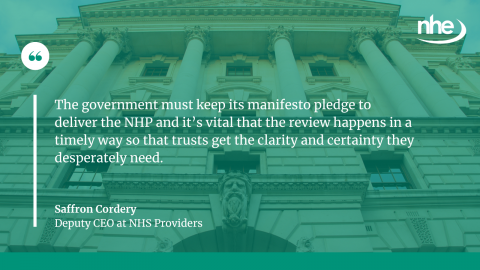New chancellor of the exchequer Rachel Reeves has announced that strike action could be set to end after the government reached an agreement with the British Medical Association (BMA) to put a new pay offer forward to junior doctors.
The new offer consists of an extra 4.05% for the 2023/24 pay year on top of the previously awarded 8.8% — this will be backdated to April 2023.
The government has also accepted the recommendations from the Review Body on Doctors’ and Dentists’ Remuneration (DDRB) for 2024/25, which works out as an average increase of more than 8% — this will be backdated to April 2024.
Other commitments from the government include:
- streamlining the way junior doctors report when they have worked extra hours;
- reforming the current system of junior doctor training and rotational placements;
- changing the name of ‘junior doctors’ to ‘resident doctors’ from September; and
- asking the DDRB to consider in its annual recommendations the overall reward package and career progression for junior doctors.
“We are recommending that members vote for the deal,” said co-chairs of the BMA’s junior doctors committee, Dr Robert Laurenson and Dr Vivek Trivedi in response to the news.
“We believe that this is the best offer available at this moment in time and that the inclusion of the additional reforms make the package a good step forward for our profession, acknowledging there is still more work to be done in the future.”
Health secretary Wes Streeting said: “This is a fair offer. Fair to junior doctors, fair to patients and fair to the NHS. It also represents an opportunity to truly reset relationships so we can begin working together to bring waiting lists down and fix the broken NHS.”
During her statement to the House of Commons yesterday on the Treasury’s public spending assessment, new chancellor of the exchequer Rachel Reeves’ headline reveal was that the government had inherited a £22bn overspend.
The immediate action outlined as a result included accepting the aforementioned recommendations of the pay review bodies — across all sectors. With this coming at a additional £9bn cost this year, the chancellor is asking government departments to absorb £3bn of this cost. Health leaders are worried this will lead to them being faced with “impossible choices” according to the NHS Confederation’s CEO, Matthew Taylor.
As part of what she described as “unfunded pressures”, Reeves also announced that the New Hospital Programme (NHP) will undergo a “complete reset” to ascertain a timetable for delivery.
She said: “In October 2020, the government announced that 40 new hospitals would be built by 2030. Since then, only 6 have started their main construction activity. And less than half of the 40 hospitals have even started construction.”
Taylor said that pausing the NHP can give time to review the health service’s broader capital needs — this includes the more-than £11bn estates maintenance backlog.
He added: "For the government to be able to deliver on their key pledge to drive down waiting lists and ensure the NHS is fit for the future, the pause to the delivery of the New Hospitals Programme must be as short as possible and NHS leaders need clarity about timelines."
Also responding to the news about the NHP, NHS Providers’ deputy CEO, Saffron Cordery, said: “The government must keep its manifesto pledge to deliver the NHP and it’s vital that the review happens in a timely way so that trusts get the clarity and certainty they desperately need.”

Research director at the Health Foundation, Anita Charlesworth, said that although pausing the NHP to ensure it delivers the requisite change is “sensible”, people will have “major concern” given the state of NHS infrastructure.
“After years of short-term decision-making, a more coherent approach to capital investment is essential,” she said.
Charlesworth added that accepting the pay review recommendations is a “step forward” while the breakthrough with the BMA is “encouraging” — but “big questions” remain at how these pay uplifts will be funded.
“High quality healthcare cannot be delivered indefinitely under the shadow of industrial relations and today’s proposals on staff pay must mark a turning point in relations between Government and NHS staff,” commented the Nuffield Trust’s CEO, Thea Stein. “Reforms to the pay review bodies are long overdue and the Government’s commitment to restore confidence in the process is positive.”
She added: “But we must be under no illusion that settling on pay will come at a cost, and the Chancellor has tasked government departments to once again look for billions of pounds of savings.
“The Chancellor’s welcome words about long-termism and prevention make absolute sense. But problems facing the public finances continue to mean that switching from fighting fires today to preventing them burning in the future seems to be all but impossible.”
Image credit: iStock
Video credit: Parliament TV



















